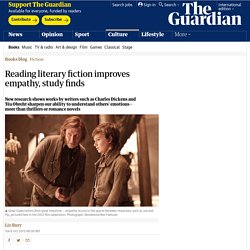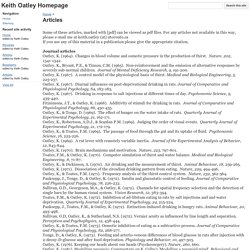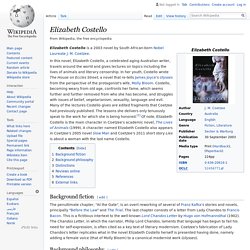

J.M. Coetzee Interview on Writers & Company - CBC Radio (excerpt) J. M. Coetzee Amy Gutmann The Lives of Animals 1999. Reading literary fiction improves empathy, study finds. Have you ever felt that reading a good book makes you better able to connect with your fellow human beings?

If so, the results of a new scientific study back you up, but only if your reading material is literary fiction – pulp fiction or non-fiction will not do. Psychologists David Comer Kidd and Emanuele Castano, at the New School for Social Research in New York, have proved that reading literary fiction enhances the ability to detect and understand other people's emotions, a crucial skill in navigating complex social relationships. In a series of five experiments, 1,000 participants were randomly assigned texts to read, either extracts of popular fiction such as bestseller Danielle Steel's The Sins of the Mother and Gone Girl by Gillian Flynn, or more literary texts, such as Orange-winner The Tiger's Wife by Téa Obreht, Don DeLillo's "The Runner", from his collection The Angel Esmeralda, or work by Anton Chekhov. "What great writers do is to turn you into the writer. 2178 4884 rbcpol 22 00329. Sobre os direitos dos animais: humanos e não humanos - Filosofia - Âmbito Jurídico.
“Com exceção dos que acreditam estar somente um pouco por debaixo dos anjos, a animalidade constitui o estrato central de nossa natureza: seguimos sendo primatas com celulares e computadores; somos todos animais.

Animais falantes, animais éticos, animais que aprendem bastante bem..., mas animais ao fim e ao cabo. E tudo o que seja omitir, ignorar deliberadamente e/ou fazer uma abstração da dimensão natural do ser humano, sua natureza animal e sua origem evolutiva é falso e viola a primeira condição de uma autoconsciência esclarecida do que somos: a assunção serena e sem complexos de nossa própria bestialidade.” Em meados do século XIX, Charles Darwin se uniu à cadeia de cientistas que, desde Aristóteles, e passando por Spinoza, Hume, Galileu e Newton (entre outros), havia contribuído para destroçar os esquemas de um mundo animista, criado e mantido por espíritos.
A partir de então, já não foi possível pensar nos humanos como seres completamente distintos do resto do reino animal. Notas: 14933889. Empathy Humaneness and Animal Welfare. B.2. On Empathy. Empathy and Judgment. Thinking Like Non Lawyers: Why Empathy is a Core Lawyering Skill. What’s Possible: The Empathetic Lawyer. Deigh Empathy Justice Jurisprudence. Pode haver diálogo verdadeiro sem empatia? Fabrício Veliq* Empatia costuma ser uma daquelas palavras que são muito faladas, mas pouco compreendidas no dia a dia.

Ela tem sua origem, segundo o dicionário etimológico, no termo grego empathéia, que, analisado, traz uma boa noção daquilo que a palavra empatia quer dizer. O termo Em tem o mesmo significado da conjunção “em” do português; pathéia, por sua vez, vem de pathós, que tem o significado de “paixão”, “sofrimento” ou “sentimento”. Dessa forma, se pode dizer que a empatia está diretamente ligada com a ideia de um sofrimento que se tem ao se colocar no lugar do outro. Ou seja, ser empático é ser aquele ou aquela que se coloca no lugar do outro na tentativa de compreender e vivenciar seu sofrimento. Articles - Keith Oatley Homepage. Buck, R.

& Oatley, K. (2007). Obituary of Robert Plutchik. American Psychologist, 62, 142.Oatley, K. & Djikic, M. (2008) Writing as thinking. Oatley 1999 Mtg of Minds.pdf. Oatley2011. StansfieldandBunce2014. Mar et al 2009 reading fiction and empathy. Oatly (1999) Oatly (1999) Peter Singer Interview on J.M. Coetzee - ABC Radio National. J.M. Coetzee, The Historical, and The Literary. 4297. Elizabeth Costello - Wikipedia. Elizabeth Costello is a 2003 novel by South African-born Nobel Laureate J.

M. Coetzee. Background fiction[edit] The penultimate chapter, "At the Gate", is an overt reworking of several of Franz Kafka's stories and novels, principally "Before the Law" and The Trial. The last chapter consists of a letter from Lady Chandos to Francis Bacon. Background philosophy[edit] Elizabeth Costello frequently engages philosophers and their ideas. Part of the debate has focused on similarities between ideas expressed by Coetzee’s protagonist and the philosophy of Mary Midgley. Distinctions[edit] 2003 longlisted for the Man Booker Prize2004 shortlisted for the Miles Franklin Award Reviews online[edit] References[edit] External links[edit] "Literature and Salvation in Elizabeth Costello, or How to Refuse to Be an Author in Eight or Nine Lessons"; in English in Africa 34, 1 (2007), 79-95.
VIDEOS.